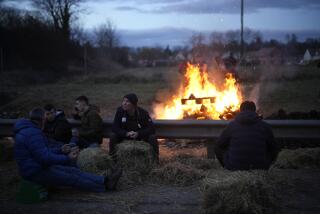Older Europeans Hoard Reflexively
- Share via
BRUSSELS — Luise Melchert of Bonn, still vigorous at 72, is old enough to have chilling memories of the food shortages of World War II. That is why, as war approached in the Persian Gulf, she stocked her pantry with bags and bags of sugar, rice and flour.
“We know what hunger means,” she says. “My children laughed about me when I told them that I am filling my stock. They can’t understand me, but I want to be prepared this time.”
To Americans, war is something that happens “over there.” Young American men and women go to Vietnam or Korea or Europe and the Pacific, but life goes on pretty much as usual at home.
To older Europeans, by contrast, war remains a stark reality, still etched deep in their consciousness after 45 years. That explains why, almost reflexively, Melchert and Europeans like her all over the Continent have flocked to the markets and sometimes fought with each other for basic foodstuffs.
“A wave of hysteria spread over Europe on the eve of the Gulf War,” said James Hanson, director of external relations for La Standa, a chain of about 500 supermarkets in Italy. “Most people were re-creating their experience in World War II.”
Although there is no way a war in the Persian Gulf could deplete Europe’s food reserves, Hanson said, business briefly doubled or even tripled at some stores during the few days immediately before and after the war began.
Shoppers concentrated on what Italians prize most--pasta, canned tomatoes, oil, salt, flour and sugar--even though Italy, a sugar importer during World War II, now produces more sugar than its people can eat. Some shoppers stocked up on both frozen food and candles, Hanson said, even though their frozen food will not last long if they need their candles during a blackout.
Hanson admitted that he laid in 22 pounds of pasta himself. “Everyone feels kind of silly about it,” he said. “But we’ll eventually eat it.”
Here in Brussels, Mark Goossens, manager of a GB supermarket, said sales exceeded normal by as much as 90% on Jan. 14, three days before the war started.
One shopper trucked away 440 pounds of flour, Goossens said. But sugar was the best seller, even though Belgium is also a sugar exporter. Goossens’ store ordinarily sells a pallet of about 700 pounds of sugar every three days; on Jan. 14, shoppers cleaned out an entire pallet in two hours.
In Belgium as elsewhere in Europe, it was mostly the elderly who stocked up. “In the old days I suffered from hunger,” said an old, stooped woman who declined to give her name. “It’s not finished, it will come back, and it will be worse.”
In France, a director of the Carrefour supermarket chain called the panic buying “worthy of the reflexes of the last world war.” The manager of a Carrefour in a Marseilles suburb said he sold 28 tons of sugar in one day immediately before the war, as opposed to 3 tons on a typical day. Oil, he said, sold in the same proportions.
Even petroleum-based laundry soap was sold in twice the usual amounts in the town of Chambray-les-Tours. “I would not have thought to stock up myself if my mother hadn’t suggested it,” said a shopper there.
The same fever struck in Rome. “I’ve been told by a neighbor to stock up on detergents,” said a woman who asked not to be named. “She’s filled her house with boxes of the stuff because, she says, it’s an oil derivative and will run out when the oil supplies run out.”
Elsewhere in Rome, a usually well-stocked wine shop was all but empty this week as Italians loaded up on what they consider among the “prime necessita. “ And a small neighborhood grocery store ran out of canned tuna when a shopper bought $640 worth.
Gianna Forlani, who owns a woman’s boutique in downtown Rome, said her mother warned her at the beginning of the Gulf War that “we should start stocking up on food like we did for the last war. And we’ll have to move out to the country now, until it’s over.”
“I’ve told her she’s not to start hoarding food, and it’s no use going to the country for this war,” Forlani said. “But of course, for her and her friends, the only war they knew was the last world war.”
Profitable as the hoarding may be for now, supermarkets expect to break even in the long run as sales dip in the future. And some food producers actually expect to come out net losers.
Albert Dardenne, director of Sucrerie Tirlemont, Belgium’s biggest sugar producer, said he had to call workers in on the Saturday and Sunday after the war began to keep up with demand.
“We have to pay a weekend premium to the personnel,” he said. “But within a few months there will be less buying. There has been no overall sales increase, just a speeding up of sales.”
Dardenne said panic buying in Belgium became contagious: When shoppers saw others stocking up on sugar, they didn’t want to be shut out.
Others blamed the news media. In Spain, for example, an article last October in Cambio 16, the country’s most influential news magazine, warned of shortages of fish, meat and coffee if war broke out in the gulf. Inflation would soar, the magazine said, and the world would tumble into recession.
In Italy, Hanson said, the Communist Party, which controls some television stations, broadcast similar warnings.
But it was none of this that motivated Luise Melchert in Bonn. Her actions were more instinctive.
“I don’t trust the politicians anymore,” she said. “They talk and talk, and suddenly the war is there and we don’t know how long we can shop before we get the lebensmittelkarten (food cards) again like we did in 1939.
“Let them laugh at me,” she said of her children. “Everything I bought will last for a long time. To have these things makes me feel better.”
Times staff writer Stanley Meisler in Barcelona, Spain, and researchers Reane Oppl in Bonn, Janet Stobart in Rome, Sarah White in Paris and Isabelle Maelcamp in Brussels contributed to this story.
More to Read
Sign up for Essential California
The most important California stories and recommendations in your inbox every morning.
You may occasionally receive promotional content from the Los Angeles Times.













